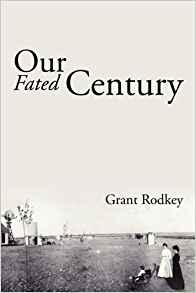Title: Our Fated Century
Author: Grant Rodkey
Publisher: IdeoPage Press Solutions LLC
ISBN: 978-1-948928-15-1
Genre: Autobiography/History
Page: 462
Reviewed by: Susan Milam
Hollywood Book Review
 Our Fated Century uses the life of Dr. Grant Rodkey to examine the changes which have occurred in culture and in the medical profession during the one hundred plus years of the author’s life. Dr. Rodkey aims to give readers an overview of the “transition […] from post-medieval society […] to the Space Age and beyond” that has taken place over the course of the last century. Although viewed through the prism of the lives of Dr. Rodkey and those around him, the author sees the seismic shifts in civilization being directed not by man, but by a living God. The doctor sees the power of God in the many “miracles” that have changed, and at times even saved, his life.
Our Fated Century uses the life of Dr. Grant Rodkey to examine the changes which have occurred in culture and in the medical profession during the one hundred plus years of the author’s life. Dr. Rodkey aims to give readers an overview of the “transition […] from post-medieval society […] to the Space Age and beyond” that has taken place over the course of the last century. Although viewed through the prism of the lives of Dr. Rodkey and those around him, the author sees the seismic shifts in civilization being directed not by man, but by a living God. The doctor sees the power of God in the many “miracles” that have changed, and at times even saved, his life.
Grant’s life convinces him that there “is a transparent, semi-permeable membrane that separates generations.” Thus, it is nigh on to impossible for anyone to learn from the experiences of those who come before them. Each person must learn for himself or herself. Still, at the age of ninety-five, Grant decides to write down some of what he “may have learned,” more as a chronicle of a century of changes than as a compendium of wisdom. Grant enters the world on November 17, 1917, the first of seven children born to Helen Elizabeth Piper and Joseph Verne Rodkey. The Rodkey home lacks the standard amenities found in most modern-day homes, but it is filled with love and music. Both of Grant’s parents are musicians, with his mother being a concert level pianist.
Grant is put in the saddle at the age of three, and from that day forward, he works the Rodkey farm with the other members of his family. The Great Depression and the effects of the Dust Bowl cost the Rodkey’s their family home. Grant graduated from high school as class Salutatorian and received a First-Year Scholarship to the University of Colorado. However, the family moved to Idaho in 1934, so Grant was not able to avail himself of the benefits of his achievement. Despite years of financial hardship to come, Grant proved to be an excellent university student and in 1939, he joined the incoming class at Harvard Medical School. Later, he found out his score on the Medical Aptitude Test was the highest in the nation that year.
For readers who have come of age during the last fifty years, the story of Grant’s path from Colorado in 1917 to becoming an esteemed member of the medical profession in the 1940s will seem almost like a fantasy. He goes from being a stowaway on a train car bound for Idaho to being a malnourished college student living in a homebuilt portable cabin to the halls of Harvard Medical School. From there he travels to Asia at the end of World War II and then returns to the States for a long career during which he develops several innovative surgical procedures and holds a office within the medical community. It is easy to understand why Dr. Rodkey views his life as emblematic of the changes going on in medicine and in the culture at large.
Grant puts family before self and God before all. Even as a young man, he extends a helping hand to those around him and he mentors others throughout his life. The lifelong relationships he forms speak to the kind of man he is, as does his respect for the foreign cultures with which he comes in contact with. Whether it be his family, his wife Dorothea, his administrative staff or the doctors around him, Dr. Rodkey freely shares the credit for his achievements.
As portrayed in Our Fated Century, Dr. Grant Rodkey is an easy man to like and to admire. He tells his story with humor, grace and humility, and he is open to new experiences wherever they may be found. Grant achieves his goal of supplying an overview of the transition from one way of life to another; and in so doing, he supplies a portrait of himself and his life’s journey that is equally fascinating.

